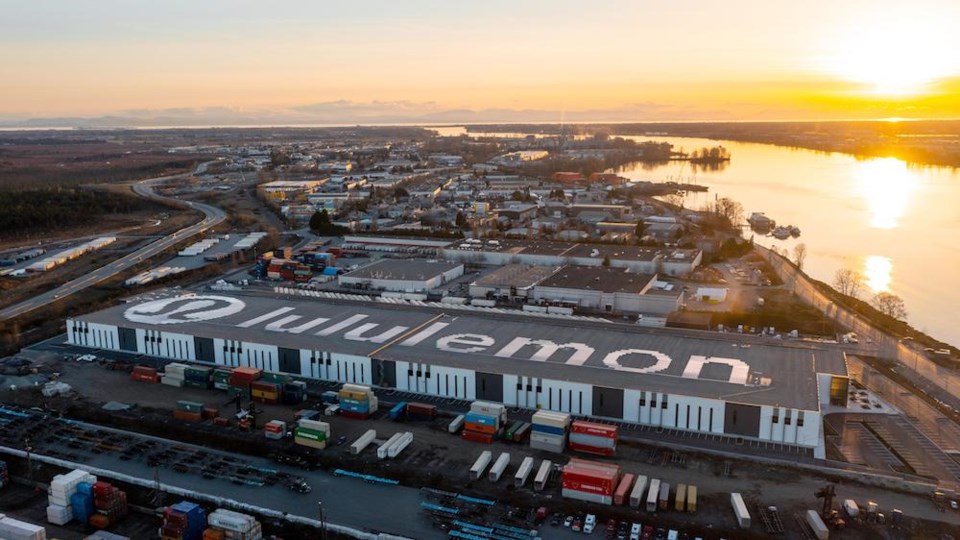Rooftop solar panels that deliver power back to the grid was perfectly aligned with the mindful approach to business B.C. yoga wear company Lululemon Athletica Inc. embraces as Wesgroup Properties LP undertook planning for its new 373,000-square-foot built-to-suit warehouse in Delta.
“They have a 100 per cent renewable energy target,” said Malcolm Shield, vice-president of sustainability at Wesgroup. “We were keen to support them in that and see what opportunities we might be able to put in place to increase the amount of renewable energy generation.”
Discussions regarding the building in 2020 led to the installation of nearly 2,600 photovoltaic panels atop the warehouse at 8600 River Road North, the largest installation of its kind in B.C. with a generating capacity of 1.2 MW. That’s enough to power 100 homes, and reduces the warehouse’s demand on the provincial power grid.
Shield says multiple variables lined up to make the project possible, from low interest rates that reduced financing costs to Lululemon’s 15-year lease that supported a long-term vision for the property.
“We had a new building, we had a tenant who was interested in this, we had local expertise, and at the time the interest rate environment allowed this to happen,” Shield explained. “Because we had a long-term tenant we were able to amortize the cost of the solar install across a much longer period, and in doing so, rolling it into the building, we were able to use the building term financing to finance the project.”
While interest rate hikes over the past year make such projects more challenging, Shield says the project has demonstrated the worth of the model.
“This is a great approach – the ability to take a much longer-term perspective,” he said, noting that Delta council and staff rallied behind the project.
“We didn’t hit any hurdles from a municipal perspective,” he said, noting that support for renewable energy projects and decarbonisation is greater than ever before.
“When you can make them work, it’s much easier to get them by than it used to be, certainly within an urban environment.”
The installation is part of BC Hydro’s net metering program, which lets customers to return excess power back to the grid when they’re generating more than they need in exchange for credits against future demand from the grid.
BC Hydro had approximately 6,500 net metering customers as of February 2023, for a total connected generation capacity of approximately 55 MW.
But that could be much greater if larger installations were possible, according to Wesgroup, which is using just a quarter of the warehouse roof surface for its installation.
This is the maximum BC Hydro permits for the site, though other jurisdictions allow for rooftop installations three times the size.
“The rule of thumb is about 80 per cent coverage maximum,” Shield said. “Under the net metering program of BC Hydro, we couldn’t actually install a larger system, but if that net metering program were to change in future, we have the ability to expand to that 80 per cent.”
BC Hydro is consulting on changes to the net metering program, but the discussions focus on rate structures rather than capacity.
Shield says the limitation is a lost opportunity as the province seeks to decarbonize its energy supply. The project for Lululemon was a chance for Wesgroup to pilot practices for reducing its greenhouse gas emissions. Wesgroup has embraced renewable energy in the past, setting up a district energy system in South Vancouver’s River District, but solar generation was a new venture.
“It’s important for us to find these projects where we can start testing and piloting what approaches we can take now so we can prepare for a greater role in renewable energy in the future,” Shield said. “This project was about us starting to get out ahead of that at scale.”
Evan Pivnick, program manager with Clean Energy Canada, an initiative of the Centre for Dialogue at Simon Fraser University in Vancouver, said Wesgroup’s initiative breaks ground but also shows how much work is left to do.
“We’re taking steps in the right direction, but as a whole B.C. is absolutely under-utilizing rooftop solar,” he said. “This is a bit of the cutting edge of trying to make projects work, because there’s a desire to see more things happen, running into the limitations of a system that really has not been built to support [them].”
Pivnick said small-scale private generating stations have the potential to be a significant source of power that need to be supported through better infrastructure rather than held back.
“The underlying challenge we have right now is we haven’t built the distribution grids to really maximize a whole bunch of small [facilities] that could, together, amount to a whole bunch of energy,” he said. “These resources are going to become more important, and the technology has been getting increasingly good for rooftop solar and, as rates have crept up as well, there’s just such a good economics in certain regions of B.C to be looking at these projects more seriously.”

